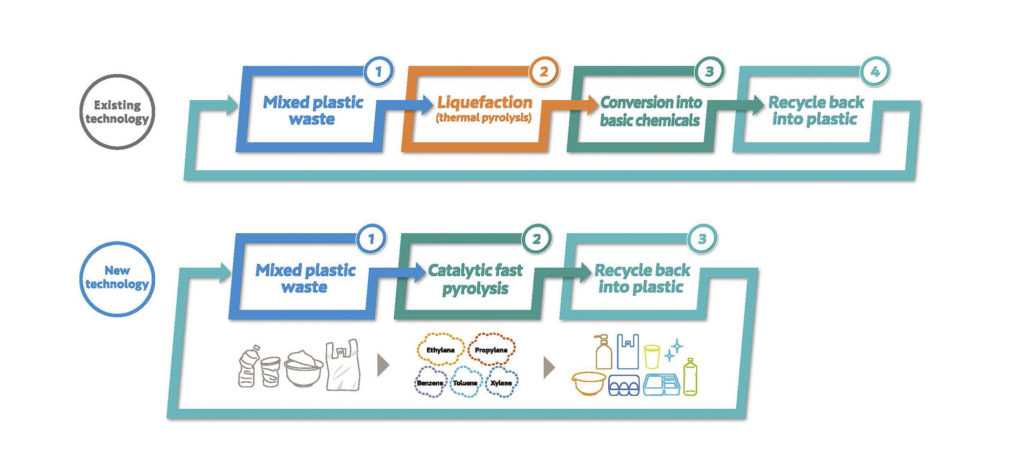TOKYO, Japan — Suntory MONOZUKURI Expert Ltd. (SME), a subsidiary of Suntory Holdings Ltd., has announced the establishment of R Plus Japan Ltd., a new joint venture company that will invest in the development of cutting-edge recycling technology for used plastics. R Plus Japan was established in partnership with 11 other cross-industry partners within the plastics supply chain.
This collaboration aims to find effective solutions to address plastics waste issues to create a more sustainable society. Member partners include TOYOBO Co. Ltd., Rengo Co. Ltd., Toyo Seikan Group Holdings Ltd., J&T Recycling Corporation, Asahi Group Holdings Ltd., Iwatani Corporation, Dai Nippon Printing Co. Ltd., Toppan Printing Co. Ltd., Fuji Seal International Inc., Hokkaican Co. Ltd., and Yoshino Kogyosho Co. Ltd.. R Plus Japan will continue seeking additional investors, and companies such as Sumitomo Chemical Company Ltd. are currently considering joining.
“The establishment of R Plus Japan is a significant step toward achieving a circular economy. While Suntory aims to achieve fully sustainable plastic in our PET bottles used globally by 2030, we are also determined to find long-lasting solutions for sustainable use of materials in other sources of plastic packaging,” says Tak Niinami, Chief Executive Officer of Suntory Holdings. “We know that our efforts will be stronger if we work together, so Suntory took the initiative to establish R Plus Japan in partnership with various committed organizations across the supply chain. This cross-industry collaboration builds on Suntory’s Yatte Minahare spirit, the spirit of bold ambition, to tackle the complex global issue of single-use plastics.”
In 2019, the Suntory Group established the “Suntory Group Plastic Policy” to promote sustainability globally and further its corporate philosophy, “To create harmony with people and nature,” as part of its promise to stakeholders, “Mizu To Ikiru”, or living with water. According to this Plastic Policy, Suntory Group will aim for 100% sustainable plastic bottles used globally by 2030, by transitioning to recycled materials or plant-based materials in all PET bottles, thus achieving zero use of virgin petroleum-based materials.
Suntory began collaborating with Anellotech, a US-based sustainable technology company, in 2012. The partnership enabled the joint development of key components needed to make 100% plant-based PET bottles. As the scientific foundation for the R Plus Japan initiative in plastics chemical recycling, Anellotech is leveraging and adapting its process technology for Plas-TCatTM, which will convert mixed plastic waste into basic chemicals to make new plastics, and has demonstrated encouraging results in lab studies.
“We believe this initiative by Anellotech and R Plus Japan, combining enabling Plas-TCat chemical recycling technology with the concerted efforts of committed supply chain players, illustrates the best model to aggregate and apply the required resources in amelioration of the problem of plastic waste,” says Anellotech CEO David Sudolsky. “Plas-TCat’s unique ability to directly produce basic chemicals (used today to make most virgin plastics) from mixed plastics waste, at large scale, represents an economically viable and impactful solution to the plastic waste problem. We are excited by the opportunities ahead and look forward to collaboration with our long-term partner Suntory and R Plus Japan in tackling this challenge.”
About the recycling technology of used plastic
Many plastic packaging materials are unable to be recycled and are instead thrown away after a single use, often landfilled, incinerated1 , or littered. Unlike the existing multi-step processes which first liquefies plastic waste back into low value “synthetic oil” intermediate products, Anellotech’s Plas-TCat chemical recycling2 technology uses a one-step thermal-catalytic process. This process converts single-use plastics directly into basic chemicals such as benzene, toluene, xylenes (BTX), ethylene, and propylene, which can then be used to make new plastics. The technology’s process efficiency has the potential to significantly reduce CO2 emissions and energy consumption. Once utilized across the industry, this technology will be able to more efficiently recycle single-use plastic, one of the world’s most urgent challenges.

1 Including thermal energy recovery
2 Chemical recycling is a process by which a polymer is chemically reduced to basic chemicals so that it can eventually be processed and remade into new plastic materials that go on to become new plastic products.
“The significance of chemical recycling is its ability to transform and convert plastic waste into its original chemical components, to eventually produce new plastics. Turning used plastic into secondary, raw materials enables the sustainable use of resources for various industries across the plastics supply chain,” said Tsunehiko Yokoi, Chief Executive Officer of R Plus Japan and Executive Officer of SME.
“Through the development of this innovative technology, we hope to contribute to solving the global plastic waste issue, which has long been a challenge due to its difficulties in recycling. We’re very excited to work with our industry partners to move this important work forward.”
With the engagement of various industries throughout the supply chain, from raw materials manufacturers, and packaging suppliers to beverages companies, the newly established R Plus Japan, together with Anellotech, will advance the development and commercialization of this eco-efficient plastic recycling technology by 2027.















